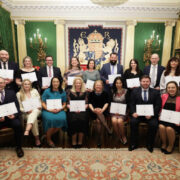Leadership and Groundedness
By Alannah Millar

People often ask me if Russia’s political atmosphere felt different. They are often so curious because it is so uniquely Russian. Leadership in Russia is culturally specific, but it is not in touch with the masses and its Achilles Heel is the fact that it is so separated from the experiences of many.
When I lived in St Petersburg, the political machine seemed miles away. So far away I had no opportunity to get involved nor could it really affect my everyday. Putin was but a figment somewhere very far away; his leadership came from miles above. Moscow and its politics seemed far away from the daily concerns of the local St Petersburgite. Even when Putin did visit St Petersburg, no ordinary citizens were disturbed or were able to reach him. He was cocooned away, safely shuttled between sites.
Don’t get me wrong, some leadership felt very real and pressing. The police presence on the streets and at every metro stop made my heart leap into my throat every time I passed them, my head physically bowing to avoid eye contact. But in general, any form of political leadership seemed untouchable. Even the city’s federal politics did not seem to disturb everyday life in the city. Decisions were made by the City Council, but it did little to make changes to the everyday life of most citizens in the city. And the decisions that did alter everyday life were hardly pleasant, such as introduction of partial mobilisation, which forcibly rounded up 300,000 men to join the fight in Ukraine.
At his annual New Year conference, where Putin was questioned by journalists, questions swirled over economics, foreign policy, military positions, and other questions which seemed so complex as to confound even political commentators. Despite speaking Russian fluently, it was one of the only times where I really felt like I needed a translator. The one representative, who seemed indicative of the masses asked a question which seemed at odds with the rest of the ceremony, meekly asking why the price of groceries had risen so much, citing that a bag of carrots had tripled in price in the last year. Putin seemed to shrug, as if the question was none of his concern, offered a litany of pretentious apologies and empty promises and moved on.
Putin’s politics are based on his untouchability. No one can criticise or alter his plans because of it, but it also leaves everyone else with no input and no sense that the end product has been created together. He goes it alone. Putin bases his leadership on the idea of him as a single figure and he operates a high-power distance style of leadership.
But that untouchability is a fault.
Leadership should be grounded with lived experience and should engage and interact with more than those at the top of the pecking order. Leadership should not be constrained by cultural myths and history. It is largely presumed that Russia cannot function without a strong autocratic leader. With its long history of tyrants, tsars, and dictators, many believe that Russia must have a strong, centralised, autocratic power. However, to excuse Putin’s regime as a necessary form of leadership in Russia is to be lulled into delusion.
This belief is proven wrong by the strong Russian support for opposition leaders, who offer a vision of a future for Russia in which leadership is drastically changed. They offer a leadership which is in touch with the grassroots, in touch with the everyday problems of the people. The Russian opposition has no one monolithic leader. It is fractured and splintered, with gloriously imperfect factions and internal divisions. Each individual has flaws and is marked by their experience with the community they live in. And that is partly the glory of the system.
Alexei Navalny, for example, chose to go back to Russia, to be amongst his community, risking arrest and further persecution after he was taken to Berlin after being poisoned. He did so because he did not believe in leading from afar; Alexei wanted to be in amongst the community and with his people. He presented himself as one of us, not one of them.
Leadership should not be detached from the everyday concerns, but rather root itself in its team. After his death, Alexei’s wife Yulia Navalnaya queued for six hours to vote in the Russian embassy in Berlin. She was in amongst the crowd and did not ask for special treatment. She was seen, felt, and heard by the Russian community.
Leadership at all levels – whether it be in national institutions, regional organisations, or local businesses – should be easily accessible, and inclusive. It should not feel elusive and far away, but here, now, and real. It should concern itself with the cost of carrots.
———————–
To keep up to date, follow our Twitter/X and LinkedIn accounts, as well as subscribing to our newsletter to get involved in future events.








